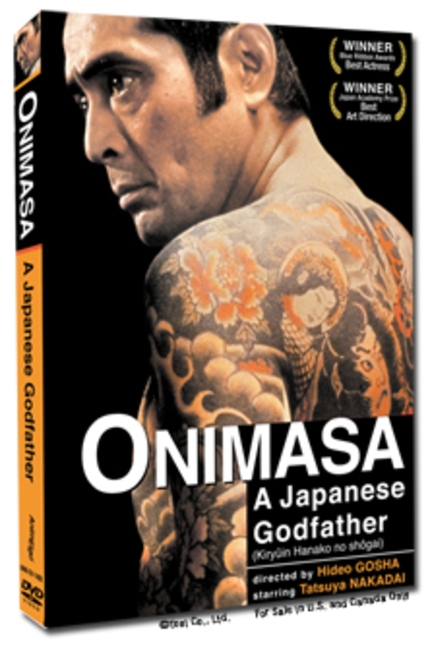DVD Review: Hideo Gosha's ONIMASA - A JAPANESE GODFATHER

AnimEigo has released a new Region 1 DVD of Hideo Gosha's Onimasa - A Japanese Godfather (Kiryûin Hanako no shôgai). The English
title of Gosha's film, which was released in 1982 by Toei Studios, is an
obvious attempt to invoke a certain set of works by Francis Ford Coppola. Onimasa has
virtually nothing in common with those Mafia masterpieces. In truth, the film
is a bloody epic drama that laces its story of an early 20th century Yakuza leader with a heavy dose of contemporary sleaze.
Tatsuya Nakadai plays Masagoro Kiryuin (aka Onimasa), who is the egotistical
head of a small-time Yakuza gang. Onimasa's chivalrous self-image is contradicted by his criminal
activities, and his desire to sleep with most any woman who isn't his wife (Shima Iwashita). One
fateful day, Onimasa pays a visit to the Shirai home in order to adopt some
children. He picks Hiraku and his sister Matsue (played by Nobuko Sendô
as a girl and Masako Natsume as an adult). The boy eventually runs away, but
Matsue stays in Onimasa's house. She is put in charge of "tending" him, and bears witness to the turmoil of the Kiryuin
house, including disease, revenge, death, and Onimasa's increasingly weird
behavior.
The film's sprawling multi-decade plot features scads of characters and branches off in
numerous directions. The story is told from the parallel perspectives of Onimasa and
Matsue. Onimasa is crazy, deluded, and somewhat good natured. Matsue is smart
and independent, but unable to escape Onimasa's emotional and physical grip. This creates a tension is presented between Onimasa's pretense of chivalry and his
efforts to stifle Matsue's attempts to expand beyond life in the Yakuza family.
Although the film focuses on the lives of these two characters, there is no doubt that Tatsuya
Nakadai is the lead. He delivers a swaggering performance that occasionally
slips into histrionics. His mugging, posturing, and yelling do match the character fairly well. In comparison, Masako Natsume gives an even and reserved performance that gets across the tragic nature of her character.
Stylistically, Onimasa: A Japanese Godfather is all over the map. The film's meshing of contemporary elements with a period setting is oddly compelling. The opening scene shows men in color-coordinated Yakuza gowns pulling Onimasa's rickshaw. Instead of classical Japanese music, the scene is set to a disco number with swirling strings. A Morricone-style score (complete with a woeful harmonica motif) solidifies the impression that Onimasa isn't shooting for complete fidelity to the time period in which it is set.
The film also has an exploitation undercurrent with plenty of sex and violence. This adds a bit of spice, but occasionally undermines the film's serious tone. The most egregious example involves a feud between Onimasa and another Yakuza
boss (played by Ryohei Uchida). The feud arises from a dog fight. The fight in question is real and is presented on
screen. Dogs are shown biting and mauling each other with blood
splattering all over the ground. The scene is absolutely essential to the plot, and organized dog fighting is a
long-standing activity in some parts of Japan. However, showing dogs hurting each other adds nothing to the story.
Audio and visual options on AnimEigo's DVD are plentiful. This anamorphic widescreen transfer of the film is presented in a 1.85:1 aspect ratio. Original and restored Japanese language Dolby Digital 2.0 audio tracks are included. Thee original track contains an analog hiss that is not present in the restored audio.
Viewers can choose between yellow or white English subtitles. AnimEigo continues its practice of using different colored subtitles to help viewers differentiate the dialogue. Explanatory annotations, which are optional and appear in the black matting at the top of the screen, are also provided. Program notes, biographies, an image gallery, and multiple trailers for Onimasa and two other Hideo Gosha films (The Wolves and The Geisha) round out the extras.







